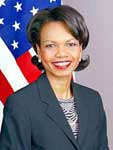N-deal: Signing on hold as US, India sort out mutual concerns
04 October 2008
 New Delhi: The signing of the Indo-US nuclear deal, widely expected to take place Saturday, with visiting US secretary of state Condoleezza Rice and Indian external affairs minister Pranab Mukherjee slated to affix their signatures to the 123Agreement, may not take place after all. On the face of it this is being put down to procedural hitches, as US president George W Bush is yet to sign the Bill into law.
New Delhi: The signing of the Indo-US nuclear deal, widely expected to take place Saturday, with visiting US secretary of state Condoleezza Rice and Indian external affairs minister Pranab Mukherjee slated to affix their signatures to the 123Agreement, may not take place after all. On the face of it this is being put down to procedural hitches, as US president George W Bush is yet to sign the Bill into law.
 For India, president Bush's signature may be of particular importance not just for technical reasons of converting a Bill into law, but specifically because it expects his signing statement to address the concerns it has with the language of the Bill.
For India, president Bush's signature may be of particular importance not just for technical reasons of converting a Bill into law, but specifically because it expects his signing statement to address the concerns it has with the language of the Bill.
It now appears that Washington may have rejected an Indian demand made just hours before Rice was to land in Delhi for a written assurance from president Bush with respect to nuclear fuel supplies.
Post ratification from the US Congress both sides let loose a volley at each other with Rice warning of serious consequences if India should test and Mukherjee responding with the oft-stated Indian line that others had the right to react even as his country retained its right to test.
This exchange of sentiments, almost immediately after both Houses of the US Congress sanctioned the Indo-US nuclear civil cooperation Bill, may have forced president Bush to pause before affixing his signatures.
Ostensibly, the reason for a lack of presidential signature on the Bill is being ascribed to the fact that various bureaucratic mechanisms of the US Congress are completely tied down with the passage of the $700 billion bailout package because of which the Indo-US nuclear Bill is yet to receive the required official 'dressings' before it is presented for presidential signature.
